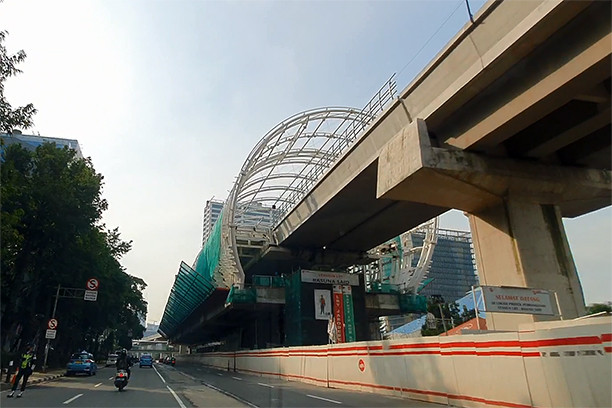Popular Reads
Top Results
Can't find what you're looking for?
View all search resultsPopular Reads
Top Results
Can't find what you're looking for?
View all search resultsPrivate sector infrastructure funding needs boost as SOEs overleveraged: World Bank
Change text size
Gift Premium Articles
to Anyone
T
he World Bank has urged the Indonesian government to improve public-private partnership (PPP) financing schemes to attract more private capital that could fill the government’s budget shortage on infrastructure projects.
“Mobilizing capital for financing infrastructure has been challenging for some sectors, particularly water resource management, where the infrastructure has been considered to be public assets and private-sector financing hasn’t been successful to date,” said World Bank energy coordinator Stephan Garnier.
Garnier said Thursday during a webinar called Indonesia Public Expenditure Review 2020: Spending for Better Results that inadequate project planning may have also dampened interest from the private sector to invest in transportation.
The government has increasingly been relying on the private sector to take part in developing, financing and managing the country’s ambitious infrastructure projects under the National Medium-Term Development Plan (RPJMN) to ease the strain on the state budget.
The National Development Planning Agency (Bappenas) has estimated that the country will need infrastructure investment worth US$429.7 billion, equal to 6.1 percent of GDP, between 2020 and 2024.
The government could only finance 30 percent of the infrastructure projects using the state budget, said the Public Works and Housing Ministry’s financing strategy director, Herry Trisaputra Zuna.
“I believe what we need to do is use our limited budget to encourage the private sector rather than concentrating on conventional [funding] efforts,” Herry said during Thursday’s webinar.
The World Bank’s transportation specialist, Elena Chesheva, said the government should continue with the consolidation of small contracts into larger ones of more than Rp 30 billion ($2.1 million) to attract bigger firms.
“Such measures are expected to increase efficiency in procurement and attract new, larger players to the market with the economy of scale and stronger quality assurance system,” she said.
The size of large contracts has been increasing over the years, with 72 percent of the spending packages recorded to be above Rp 30 billion, rising from 31 percent in 2013, according to the World Bank’s report.
The government is also urged to decrease its reliance on state-owned enterprises (SOE) to execute toll and national road projects, while allowing private companies to build economically viable projects as SOEs were already highly leveraged.
“We recommend that the government revise its decision-making [process] and consider whether the project is good for leveraging private financing before looking at the potential allocation for public-sector financing,” Elena said.
The World Bank’s report shows that the liability-to-equity (LE) ratio of SOEs involved in toll and national road development projects has already reached a high level.
Toll road operator Jasa Marga, construction company Waskita Karya and Hutama Karya’s average LE ratio in 2017 stood at 3.8, more than twice as high as the average LE ratio for comparable private firms in emerging markets.
In the water and sanitation sector, the World Bank report found that the majority of city and regency-owned tap water companies (PDAM) were relying heavily on government subsidies as they were operating in a state of loss. This had hampered efforts to upgrade into using the PPP framework.
“From more than 400 PDAMs across Indonesia, only 10 percent are financially healthy. Half of the PDAMs don’t even impose fees on their customers that could cover their full costs,” the World Bank’s water and sanitation specialist Irma Magdalena Soetiono said.
Additional investment was critical for the government’s target of 100 percent access to clean water and improved sanitation services, according to the World Bank.
Between 2001 and 2016, Indonesia spent only an average 0.2 percent of its GDP to develop and improve water and sanitation systems, the same rate as the Republic of Congo and the Central African Republic.
“We urge the PDAMs to improve their financial condition, so that, in the future, they can be supported with nonpublic funding,” Irma said.
Responding to the World Bank’s recommendations, Herry said the government divided infrastructure projects into “solicited” and “unsolicited” projects based on the project’s economic viability to increase private funding through PPP schemes.
Infrastructure projects that were initiated and mostly funded by the government were labeled as “solicited”, while the private-company-initiated projects that were economically viable were labeled “unsolicited”.
“For example, in toll road projects that are not viable, we assign Hutama Karya to run the project. However, it is a corporate decision to invest in toll roads that are viable,” he said.










